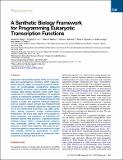| dc.contributor.author | Khalil, Ahmad S. | |
| dc.contributor.author | Lu, Timothy K. | |
| dc.contributor.author | Bashor, Caleb | |
| dc.contributor.author | Ramirez, Cherie L. | |
| dc.contributor.author | Pyenson, Nora C. | |
| dc.contributor.author | Joung, J. Keith | |
| dc.contributor.author | Collins, James J. | |
| dc.date.accessioned | 2014-11-20T13:13:29Z | |
| dc.date.available | 2014-11-20T13:13:29Z | |
| dc.date.issued | 2012-08 | |
| dc.date.submitted | 2012-04 | |
| dc.identifier.issn | 00928674 | |
| dc.identifier.issn | 1097-4172 | |
| dc.identifier.uri | http://hdl.handle.net/1721.1/91623 | |
| dc.description.abstract | Eukaryotic transcription factors (TFs) perform complex and combinatorial functions within transcriptional networks. Here, we present a synthetic framework for systematically constructing eukaryotic transcription functions using artificial zinc fingers, modular DNA-binding domains found within many eukaryotic TFs. Utilizing this platform, we construct a library of orthogonal synthetic transcription factors (sTFs) and use these to wire synthetic transcriptional circuits in yeast. We engineer complex functions, such as tunable output strength and transcriptional cooperativity, by rationally adjusting a decomposed set of key component properties, e.g., DNA specificity, affinity, promoter design, protein-protein interactions. We show that subtle perturbations to these properties can transform an individual sTF between distinct roles (activator, cooperative factor, inhibitory factor) within a transcriptional complex, thus drastically altering the signal processing behavior of multi-input systems. This platform provides new genetic components for synthetic biology and enables bottom-up approaches to understanding the design principles of eukaryotic transcriptional complexes and networks. | en_US |
| dc.description.sponsorship | National Science Foundation (U.S.) (CCF-1124247) | en_US |
| dc.description.sponsorship | United States. Office of Naval Research. Multidisciplinary University Research Initiative (Grant) | en_US |
| dc.language.iso | en_US | |
| dc.publisher | Elsevier | en_US |
| dc.relation.isversionof | http://dx.doi.org/10.1016/j.cell.2012.05.045 | en_US |
| dc.rights | Article is made available in accordance with the publisher's policy and may be subject to US copyright law. Please refer to the publisher's site for terms of use. | en_US |
| dc.source | Elsevier | en_US |
| dc.title | A Synthetic Biology Framework for Programming Eukaryotic Transcription Functions | en_US |
| dc.type | Article | en_US |
| dc.identifier.citation | Khalil, Ahmad S., Timothy K. Lu, Caleb J. Bashor, Cherie L. Ramirez, Nora C. Pyenson, J. Keith Joung, and James J. Collins. “A Synthetic Biology Framework for Programming Eukaryotic Transcription Functions.” Cell 150, no. 3 (August 2012): 647–658. © 2012 Elsevier Inc. | en_US |
| dc.contributor.department | Massachusetts Institute of Technology. Department of Electrical Engineering and Computer Science | en_US |
| dc.contributor.department | Massachusetts Institute of Technology. Synthetic Biology Center | en_US |
| dc.contributor.mitauthor | Lu, Timothy K. | en_US |
| dc.relation.journal | Cell | en_US |
| dc.eprint.version | Final published version | en_US |
| dc.type.uri | http://purl.org/eprint/type/JournalArticle | en_US |
| eprint.status | http://purl.org/eprint/status/PeerReviewed | en_US |
| dspace.orderedauthors | Khalil, Ahmad S.; Lu, Timothy K.; Bashor, Caleb J.; Ramirez, Cherie L.; Pyenson, Nora C.; Joung, J. Keith; Collins, James J. | en_US |
| dc.identifier.orcid | https://orcid.org/0000-0002-9999-6690 | |
| mit.license | PUBLISHER_POLICY | en_US |
| mit.metadata.status | Complete | |
